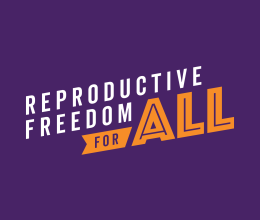Bush's stand on abortion calls for moral clarity
Following one of the closest and most contentious elections in recent memory, pundits across the country blamed "moral values" as the social fault line dividing America. The president, who believes that the election results gave him "political capital" to spend, can be fully expected to do so on an issue that his far-right constituency cares deeply about -- overturning Roe v. Wade.
He has stated clearly that he will do what is necessary to limit women's reproductive rights. As he begins his second term, and following the weekend celebrations of the 32nd anniversary of Roe v. Wade, we should ask whose moral values are we talking about?
What is moral, for example, about spending millions of taxpayer dollars on programs that deny sexually active teens information they need to protect themselves from pregnancy and sexually transmitted infection?
Since 1997, more than half a billion dollars have been allocated to sex education programs that focus exclusively on abstinence, censoring any information that might enable young people to make responsible and healthy decisions. There is no conclusive evidence that abstinence-only programs work, although there is evidence that they deter sexually active teens from using appropriate protection. Despite this reality, and despite testimony from parents of school-aged children rejecting this approach, the Michigan Legislature recently passed legislation that dismantles a comprehensive sex-education curriculum used in public schools.
What is moral about denying a rape victim assistance to prevent a pregnancy resulting from an assault?
Emergency contraception, a form of birth control that when taken within days of unprotected intercourse reduces the risk of pregnancy by as much as 89 percent, has become one of the most recent targets of attack. With it, up to 22,000 pregnancies that result each year from rape could be prevented. Yet, in releasing the first-ever national protocol for treating sexual assault victims, President George W. Bush's Justice Department excluded any mention of emergency contraception.
What is moral about spending thousands of desperately needed taxpayer dollars to defend laws passed by the Michigan Legislature that would prevent physicians from protecting the health or life of a woman when she or he believes it is medically necessary?
Like two previous Michigan bills successfully challenged by the American Civil Liberties Union in federal courts, the "legal birth definition act," passed last spring by the Michigan Legislature, does not contain a sufficient health exception in accordance with requirements set out by the Supreme Court. The American Civil Liberties Union of Michigan has to, yet again, prepare litigation to fight this latest effort to ban abortion in Michigan.
What is moral about denying health coverage to a pregnant woman in need of an abortion when her doctor believes it is necessary to protect her health?
Government health services programs for the poor, such as Medicaid, limit abortion coverage to cases where a woman's pregnancy is the result of rape or incest or if her life is in jeopardy. It will not pay for an abortion if a woman's health is threatened.
What is moral about forcing a low-income woman to choose between paying for an abortion she needs to preserve her health and paying for food, shelter and other basic necessities for her family?
Indeed, what is moral about forcing a woman to continue a pregnancy when she is unable to care for a child? When she wants to finish high school or isn't financially or emotionally ready to become a parent?
We live in a world now where health care workers at places such as Planned Parenthood that provide a wide range of health care services, including prenatal care and parenting skills classes, have to work behind bullet-proof glass; where fewer and fewer medical schools are willing to train physicians to provide abortions; and where physicians have to bear the interference of the far right in the provision of their medical services.
The moral value that I cherish is a world in which every child is a wanted child. The moral value that I cherish is a world in which physicians and health care workers can offer the best medical treatment needed and possible to their patients.
The moral value that I cherish is a world in which every woman is able to freely exercise her most basic right to make decisions about her body free from governmental interference and with the best medical information possible.
By Kary Moss
Despite gains, women continue to battle against the erosion of reproductive rights
Roe v. Wade ignites fight about legacy of abortion rights
There is a lot of talk about the possible overturning of Roe v. Wade. But for many women, it will not take a decision by the U.S. Supreme Court to make legal abortion a thing of the past. The process has already begun.
Anti-choice forces have been chipping away at the right to abortion from its inception. Still, on the 32nd anniversary of Roe, it's important to celebrate the monumental step that changed the lives of American women.
Rather than concentrating on whether we are in danger of losing Roe, we must focus on defending against the constant attempts to erode our reproductive rights.
If lawmakers have their way, more and more women will be thwarted in their efforts to prevent unwanted pregnancies and to obtain an abortion if and when they need one. Without comprehensive reproductive health services, including access to abortion, women cannot fully participate in the workforce or in the political arena, or make responsible choices for themselves and their families.
For instance, contraceptive equity legislation has languished because so few Michigan lawmakers are concerned that women must pay out of pocket for contraception, but still ensure that Viagra is accessible to men and covered by insurance plans.
The Legislature also recently passed a bill that further dismantles the public school comprehensive sex education curriculum, in spite of testimony from parents of school-aged children troubled by an abstinence-only approach when evidence shows their teens may be sexually active. Let's face it, many parents are not comfortable discussing this issue with their child and depend on a neutral source to help their teens become knowledgeable about appropriate precautions to prevent unwanted pregnancy and sexually transmitted diseases.
On a federal level, the policies of the Bush administration have been restrictive and equally counterproductive for reproductive health. While the abortion rate is on the rise, the Justice Department's national protocol for treating sexual assault victims excludes any mention of emergency contraception (EC), a form of birth control that when taken within days of unprotected intercourse reduces the risk of pregnancy by as much as 89 percent.
In a recent study published by the American Civil Liberties Union, it was reported that in eight of 11 states, less than 40 percent of emergency-care facilities regularly provide EC on-site to rape survivors.
And it is likely that the Federal Drug Administration will soon reject the drug's over-the-counter availability. What makes this even more egregious is that 22,000 pregnancies that result each year from rape could be prevented if emergency facilities offered EC -- a number that is likely to be even greater when you consider that many women who have been raped never go to an emergency room.
These laws affect all women -- rich or poor, teens and adults -- who seek abortions in Michigan. Incremental restrictions have made abortion risky and burdensome, and in some cases have blocked access altogether.
For example, women are forced to wait up to 24 hours after receiving state-mandated information designed to dissuade them from choosing abortion. Given that 81 percent of counties in Michigan lack an abortion provider, for many women, especially those living in rural areas, these delays can impose real impediments to care. They can mean costly travel, complicated and expensive child care arrangements, and unnecessary time away from jobs -- any of which may amount to an insurmountable obstacle.
This state-required delay also presumes that a woman has not already given serious thought to the consequences of continuing or terminating a pregnancy.
Thirty-two years ago the U.S. Supreme Court recognized that a woman's ability to choose abortion is fundamental. A woman's autonomy and equality must not be compromised.
By Jacquelin Washington



